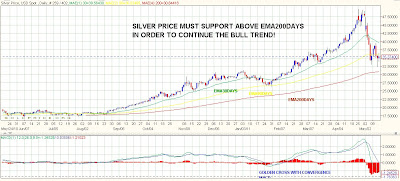
When I read recently that people were lining up to cash in their sterling silverware and heirloom silver tea services, I figured the end must be near: the end of the silver bubble and, more broadly, the long-running bull market in precious metals and commodities.
Have we actually been in a precious metals bubble? Having lived through the recent Internet and real-estate bubbles, you’d think it would be easy to tell. But bubbles are all but invisible until they burst. Soaring prices seem rational—fueled by rising demand from India and China, for example—until they don’t. But lately the silver market has certainly shown many telltale signs.
After more than doubling in the past year and hitting a 31-year-high last Friday, silver prices plunged nearly 30% this week, falling below $35 per troy ounce on Thursday. They dropped a dizzying 12% in just 11 minutes after Asian markets opened Sunday evening eastern U.S. time. Then the Wall Street Journal reported that prominent hedge-fund investors like George Soros were dumping silver, which triggered more selling.
The silver panic spilled over into gold and copper as well, though to a much smaller degree. Yet precious metals, even silver, are still showing healthy gains for the year. In my view, the recent turmoil suggests it’s time to take some profits, or at least reduce precious metals and commodity allocations to prudent levels.
I don’t own any gold or silver per se, and have never recommended speculating in precious metals. But I do own and have recommended a variety of inflation hedges, including broad commodity funds and exchange-traded finds as well as shares of Australia’s BHP Billiton, the world’s largest diversified commodity producer. As I’ve pointed out before, some country-specific ETFs, such as Brazil and Russia, are really commodity plays. None of these funds have been anywhere near as volatile as silver or the iShares Silver Trust, but their values have swollen beyond my targeted allocations.
BHP has buoyed my portfolio over the last three years, surging from $32 a share in 2009 to a peak of $101 last month. I’ve never sold a share, and in the process it’s become my second largest holding (after Google). Despite the recent commodities selloff, its shares have dropped just $8, to $96. The Brazil ETF I own— iShares MSCI Brazil Index —has 35% of its holdings in just two companies: oil producer Petrobras and commodity giant Vale. Since peaking at nearly $82 a share in November, the ETF’s shares have dropped over 10% to about $73. Even so, shares have more than doubled since their 2009 low. I believe it’s time to prune both positions.
This doesn’t mean I know the commodity market has peaked. Hedge-fund investor John Paulson, now legendary for shorting the subprime mortgage market and for betting on gold, remains a big gold bull. I’m even less inclined to predict the future direction of commodity prices than I am the direction of the stock market. What I do know is that these assets have had huge run-ups, at rates that simply can’t be sustained over long periods of time.
I still maintain that all investors should own hedges against the possibility of future inflation, and commodities and stocks of commodity producers provide such protection. But in my view they shouldn’t exceed 10 to 20% of a portfolio for most investors—and now is the time to rebalance.
The news event of last week, if not the year, was the long-awaited capture and killing of Osama bin Laden. It would surely have disappointed the mastermind of the Sept. 11 attacks that world markets barely registered the event. One of bin Laden’s stated goals was to disrupt air travel and global commerce, and, more broadly, to wreck the capitalist global economy.
As markets plunged in 2001 and recession deepened, he must have felt that he had succeeded. Then American and global capitalism demonstrated remarkable resilience. By the time reckless mortgage lenders and others plunged the world into a far more serious financial crisis and recession, bin Laden had been rendered irrelevant. And the global economy is recovering once again.
All involved in the successful pursuit of bin Laden deserve credit for their perseverance and courage in bringing him to justice. But so do the millions of ordinary people who in the wake of the terrorist assaults, put aside their fears, rededicated themselves to their jobs and dreams, and helped thwart bin Laden’s ambition to destroy our economy. Thanks in large part to their efforts, bin Laden was defeated long before he was captured and killed this week.










No comments:
Post a Comment